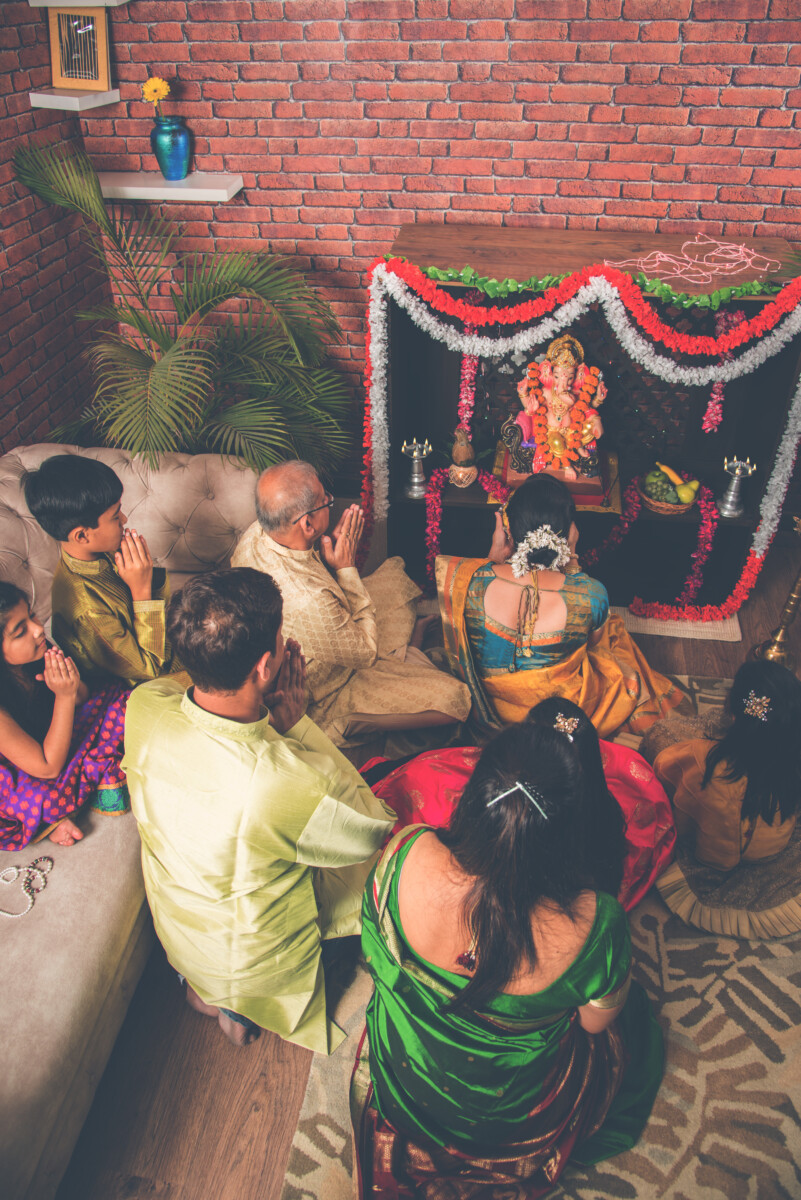Express, Short, and Thorough Pūjās
Pūjā at Home — A Practical Guide for Hindu Americans
01
Introduction
Pūjā is a common practice in Hindu spirituality. It is a reciprocal act of respect, gratitude, and devotion to the Supreme Being, illumined beings (devas), significant spiritual figures, even ancestors. Whether daily or occasional, it sanctifies the home, purifies the mind, and strengthens spiritual connection. It’s also a way to reconnect with our ancestral roots, and strengthen the cultural bonds that have held and can hold our families and communities together for generations.
In the United States, living spaces, schedules, and access to traditional items may differ from places where pūjā is more commonplace — but the heart of pūjā remains unchanged: sincerity, mindful awareness, and devotion.
This guide presents three authentic formats:
- Express Pūjā — for those busy days or when traveling
- Short Pūjā — for regular daily spiritual practice
- Thorough Pūjā — for regular spiritual practice if you have time, or for special occasions and festivals
All follow recommendations from Vedic, Purāṇic, and Āgamic sources, and are consistent with the Bhāgavata Purāṇa guidance for the current age (Kaliyuga).
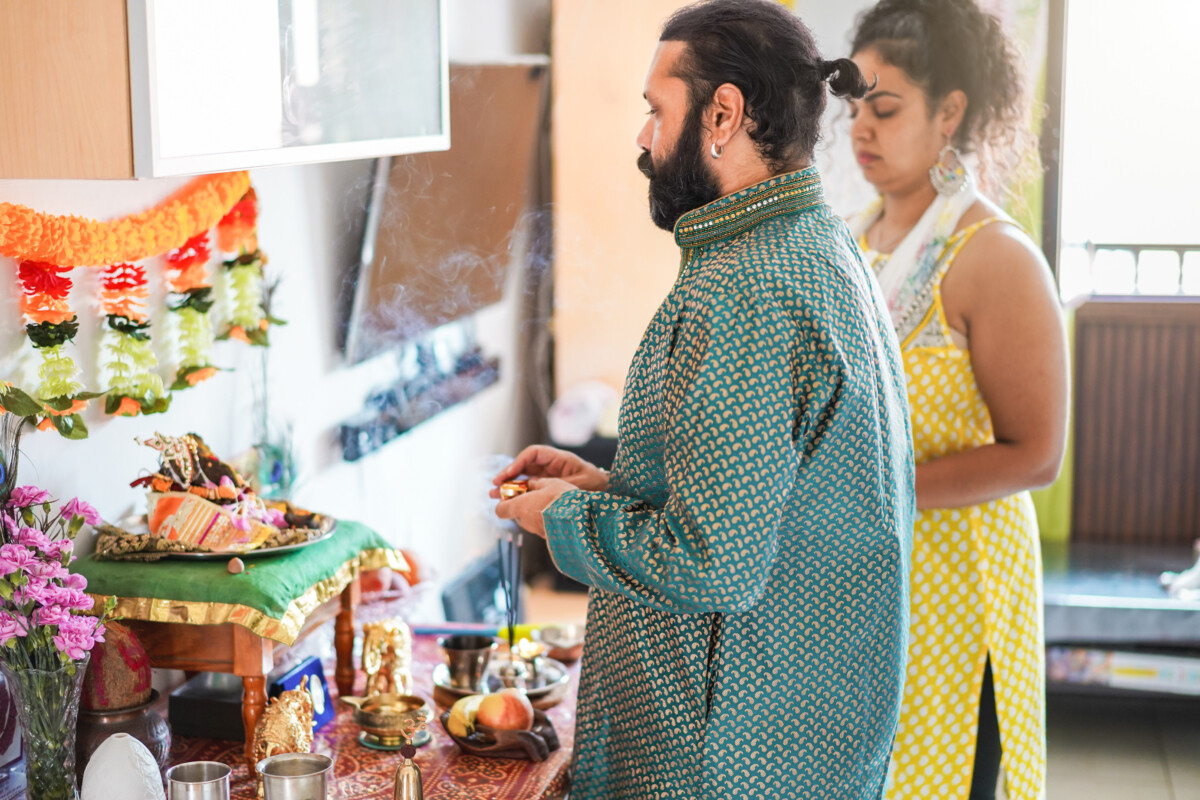
02
Glossary
- Pūjā — Reciprocal dedication of items that symbolize a person’s devotion and/or gratitude to the focus of their pūjā.
- Veda — Ancient Hindu sources of knowledge in Vedic traditions.
- Purāṇa — Ancient Hindu sources of knowledge referred to across various traditions.
- Āgama — Ancient sources of knowledge from the Āgamic traditions.
- Bhāgavata Purāṇa — One of the eighteen Mahā Purāṇas.
- Kaliyuga — Present age in Hindu time cycles.
- Rangolī — Decorative floor patterns.
- Thālī — Metal/clay/leaf/wooden plate/tray.
- Nirmālya — Items from a completed pūjā.
- Prasādam — Food/items after a completed pūjā, literally, the grace or kindness of the recipient of pūjā.
- Mūrti — Sacred icon or embodiment.
- Āsana — Seat or mat for pūjā.
- Gandha — Fragrance (sandalwood paste or essential oils).
- Puṣpa — Flower.
- Patra — Leaf, especially leaves from sacred plants like Tulasī, Bilva, etc.
- Dhūpa — Incense.
- Dīpa — Ghee or oil lamp.
- Naivedya — Food items.
- Upacāra — Item or act of dedication.
- Dhyāna — Meditation.
- Kṣamāpanam — Asking for the fulfilment of any intentionally or unintentionally omitted steps or any mistakes.
03
General Preparation
Before starting any pūjā:
- Gather natural, ethically-sourced materials — Look for organic, seasonal, non-GMO, non-artificial, and non-harmful items to dedicate in pūjā.
- Clean the space — Wipe surfaces, sweep floors, and decorate the area with flowers or a small raṅgolī if desired.
- Clean yourself — Shower, and before starting wash hands, feet, and face; wear clean clothing, reserved for pūjā preferably.
- Arrange items neatly — Use a tray (thālī) for items to be dedicated.
After pūjā, all offered items (nirmālya⁹ or prasādam¹⁰) should be:
- Shared and consumed if edible
- Stored if usable in another way (e.g. rice used in pūjā can used to make kheer or pāyasam later on)
- Returned to nature respectfully — buried, composted, or placed in running water, pursuant to local ordinances.
Crafting Your Pūjā Mantra
A pūjā mantra has two key parts:
- Salutation — showing reverence to the devatā, guru, or other being worthy of veneration.
- Dedication — naming the offering and act
Formula
auṁ śrī [name in correct form] namaḥ
[offering] [action]
auṁ śrī gauryai namaḥ
puṣpaiḥ pūjāyāmi
“I bow to Gaurī and venerate Her with flowers.”
Name changes in mantras:
- Masculine name ending in -a → -āya (Rāma → Rāmāya)
- Masculine name ending in -u → -ave (Viṣṇu → Viṣṇave)
- Feminine name ending in -ā → -yai (Durgā → Durgāyai)
- Feminine name ending in -ī → -yai (Lakṣmī → Lakṣmyai)
If you’re unsure how to change the name:
- Masculine — [Name] devāya (e.g. sūrya-devāya)
- Feminine — [Name] devyai (e.g. rājarājeśvarī-devyai)
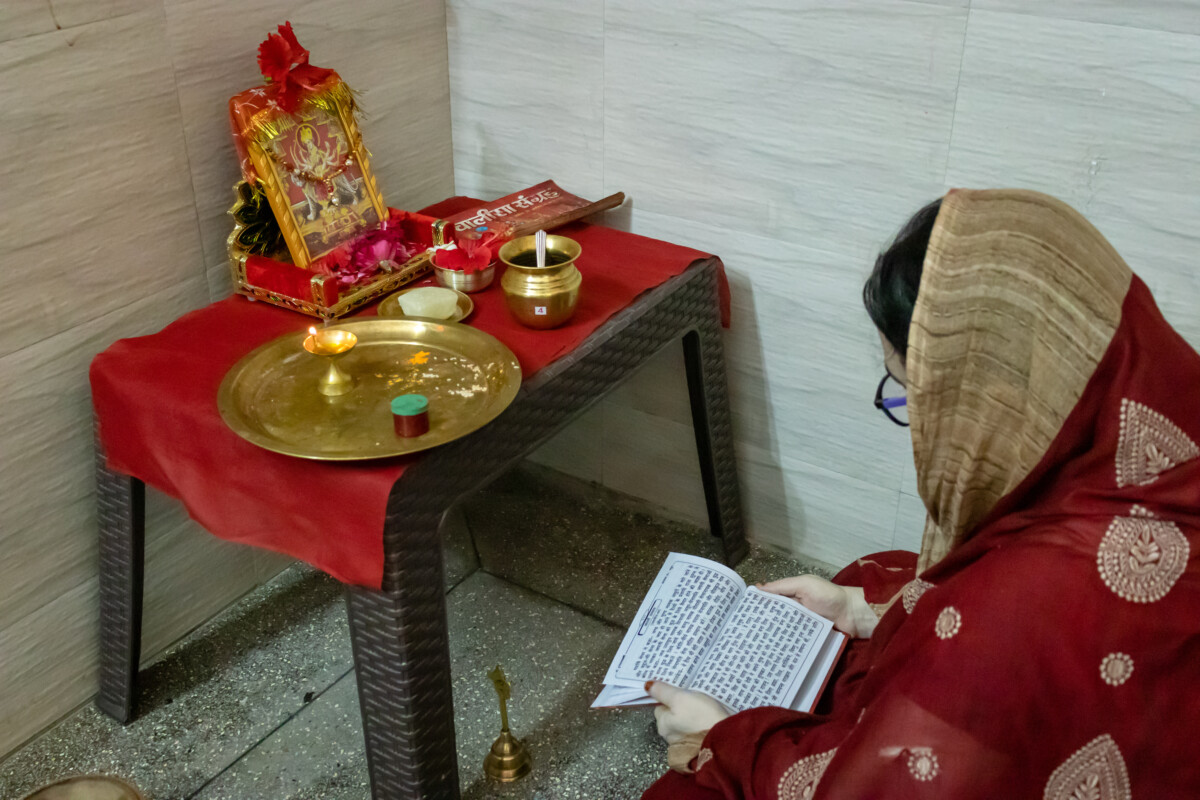
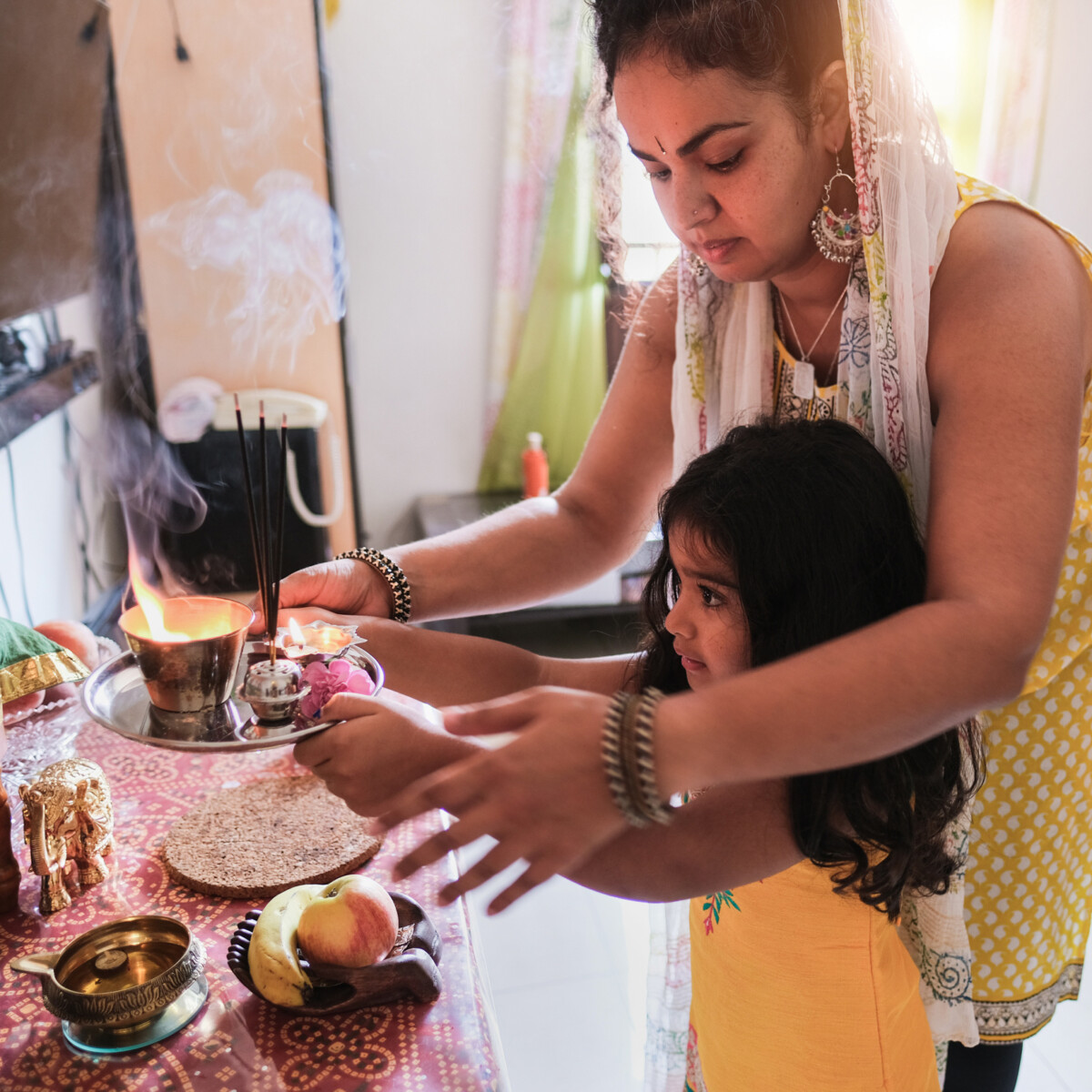
Preparing Your Shrine
- Place a mūrti, picture, or symbol of the Supreme Being, illumined being (devas), or spiritual figure on a raised surface. This is your shrine. Place a seat (āsana) for yourself in front of the shrine.
- Arrange items you wish to dedicate in front of the shrine, and the implements you’ll need nearby. Keep a towel to wipe your hands, and a separate towel for the shrine.
04
Three Pūjā Methods
1. Express Pūjā
Time: 5–7 minutes
Method:
Dhyāna²¹ — Sit facing the shrine, meditate on the deity.
- Closing your eyes, take three deep breaths (or do prāṇāyāma).
- Envision the image, name, symbol, or attributes of the recipient of your pūjā.
- Lastly, slowly chant auṁ three times to start the pūjā.
Upacāra — Sequentially dedicate each item with mantras. Choose any 3 offerings:
- gandha (fragrance) – [insert pūjā mantra] gandhaṁ samarpayāmi
- puṣpa (flowers) – [insert pūjā mantra] puṣpaiḥ pūjayāmi
- dhūpa (incense) – [insert pūjā mantra] dhūpam āghrāpayāmi
- dīpa (lamp) – [insert pūjā mantra] dīpaṁ darśayāmi
- naivedya (food) – [insert pūjā mantra] naivedyaṁ nivedayāmi
Conclude with clasped-hand mantra and bow.
- kṣamāpanam — “Forgive me for any errors in this ceremony.”
- tīrtha-prasāda-grahaṇa — Partake of and share the prasādam.
- Store or respectfully return dedicated items to nature.
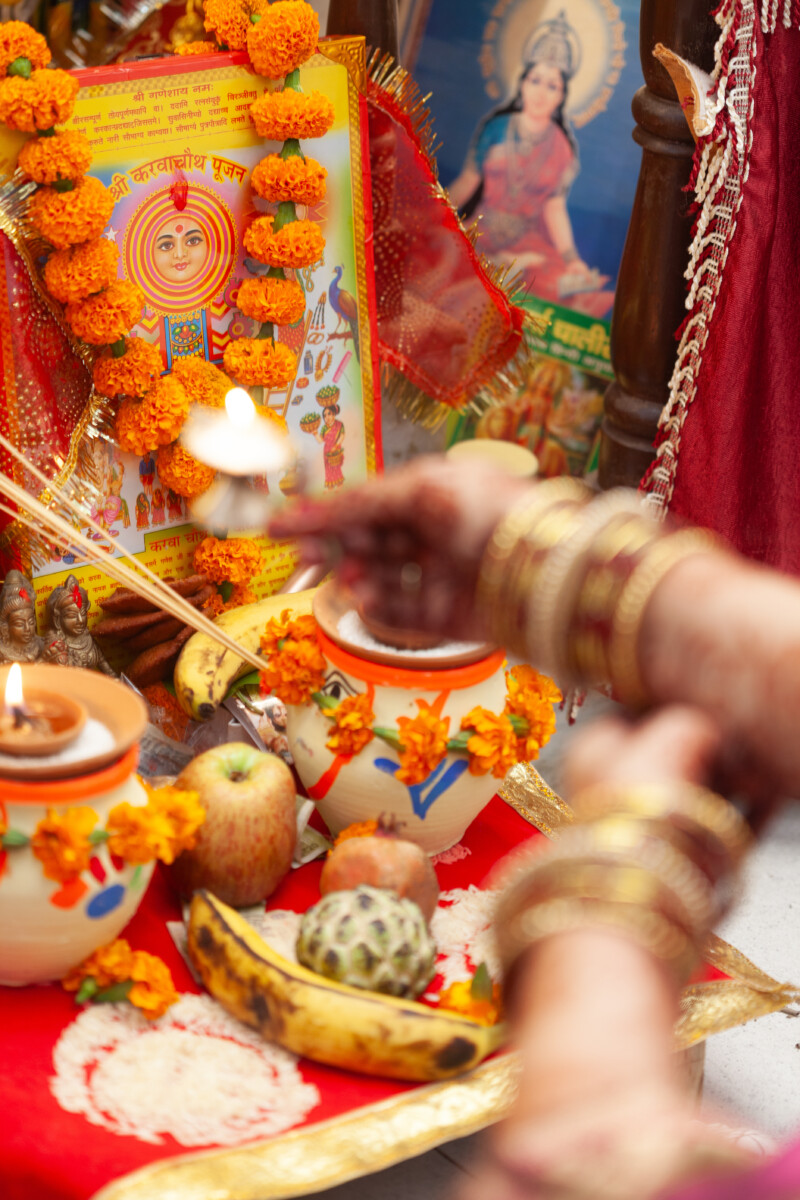
2. Short Pūjā — Five Upacāras
Time: 10–12 minutes
Method:
Dhyāna²¹ — Sit facing the shrine, meditate on the deity.
- Closing your eyes, take three deep breaths (or do prāṇāyāma).
- Envision the image, name, symbol, or attributes of the recipient of your pūjā.
- Lastly, slowly chant auṁ three times to start the pūjā.
Upacāra — Sequentially dedicate each item with mantras.
- gandha (fragrance) – [insert pūjā mantra] gandhaṁ samarpayāmi
- puṣpa (flowers) – [insert pūjā mantra] puṣpaiḥ pūjayāmi
- dhūpa (incense) – [insert pūjā mantra] dhūpam āghrāpayāmi
- dīpa (lamp) – [insert pūjā mantra] dīpaṁ darśayāmi
- naivedya (food) – [insert pūjā mantra] naivedyaṁ nivedayāmi
Conclude with clasped-hand mantra and bow.
- kṣamāpanam — “Forgive me for any errors in this ceremony.”
- tīrtha-prasāda-grahaṇa — Partake of and share the prasādam.
- Store or respectfully return dedicated items to nature.
3. Thorough Pūjā — Sixteen Upacāras [Ṣoḍaśopacāra/Shodashopachara]
Time: 20–30 minutes
Method:
Dhyāna²¹ — Sit facing the shrine, meditate on the deity.
- Closing your eyes, take three deep breaths (or do prāṇāyāma).
- Envision the image, name, symbol, or attributes of the recipient of your pūjā.
- Lastly, slowly chant auṁ three times to start the pūjā.
Upacāra — Sequentially dedicate each item with mantras.
- āsana (Offering a seat) – [insert pūjā mantra] āsanaṁ samarpayāmi
- pādya (Washing the feet) – [insert pūjā mantra] pādyaṁ samarpayāmi
- arghya (Offering water to hands) – [insert pūjā mantra] arghyaṁ samarpayāmi
- ācamanīya (Offering water for sipping) – [insert pūjā mantra] ācamanīyaṁ samarpayāmi
- snāna (Bathing the deity (physically or symbolically)) – [insert pūjā mantra] snānīyaṁ samarpayāmi
- vastra (Offering cloth) – [insert pūjā mantra] vastraṁ samarpayāmi
- gandha (Fragrance/sandalwood paste) – [insert pūjā mantra] gandhaṁ samarpayāmi
- akṣata (Unbroken rice grains) – [insert pūjā mantra] akṣatān samarpayāmi
- puṣpa (Flowers) – [insert pūjā mantra] puṣpaiḥ pūjayāmi
- dhūpa (Incense) – [insert pūjā mantra] dhūpam āghrāpayāmi
- dīpa (Ghee lamp) – [insert pūjā mantra] dīpaṁ darśayāmi
- naivedya (Food (plus three spoons of water after dedicating the food)) – [insert pūjā mantra] naivedyaṁ nivedayāmi, ante ācamanīyaṁ samarpayāmi
- ṛtu-phalāni (Seasonal fruits) – [insert pūjā mantra] ṛtuphalāni samarpayāmi
- tāmbūla (Betel leaves/nuts) – [insert pūjā mantra] tāmbūlaṁ samarpayāmi
- dakṣiṇā (Monetary offering) – [insert pūjā mantra] dakṣiṇāṁ samarpayāmi
- nīrājana (Final waving of camphor flame) – [insert pūjā mantra] karpūra-nīrājanaṁ samarpayāmi
Conclude with clasped-hand mantra and bow.
- kṣamāpanam — “Forgive me for any errors in this ceremony.”
- tīrtha-prasāda-grahaṇa — Partake of and share the prasādam.
- Store or respectfully return dedicated items to nature.
